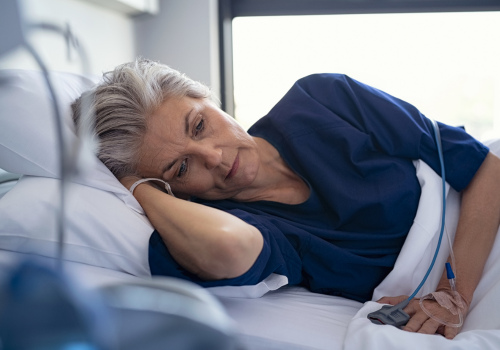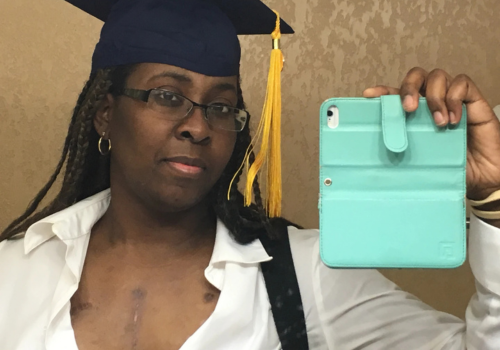By Tami Kamin Meyer, Next Avenue
Cardiac surgery survivors experience significant depression and anxiety post-op, but the absence of mental health programs underscores the need for competent therapists
I suffered a mild heart attack on Jan. 26, 2024, but didn't know it. I was concerned about my sudden inability to breathe and couldn't understand why I was unable to get comfortable for sleeping. On Jan. 28, I was told by urgent care I was suffering from a stomach virus. On Jan. 30, I met with a physician's assistant as my longtime physician was out that day.
Without checking my blood, the PA labeled my malady virus-related. I turned 60 on Jan. 31. On Feb. 4, I became hysterical from exhaustion as I had been unable to find a suitable sleeping position since late January. I called my doctor's office, praying someone would answer on a Sunday. Luck was with me as my own physician was on call.
He directed me to the emergency department. I went immediately. I was hysterical there, too. The doctor dismissed my pleas, offering me Adavan for my "anxiety." I agreed I was anxious, but defiantly responded it was because I was scared, exhausted and defending myself against him. My persistence paid off. My life was saved by my stubbornness and the skilled cardio-thoracic surgeon who performed a triple bypass on me Feb. 8.
My post-surgery journey
My last memory before that life-altering surgery is permanently etched in my psyche. As I was being wheeled into the operating arena, I vividly recall passing under an obnoxiously bright, fluorescent ceiling light overhead. In that final moment of semi-coherence, I said to myself, "Here goes. Your life will be forever changed from this moment on."
When I woke in ICU, I was crying. I was grateful to be alive but felt incredibly fearful. Alone. In excruciating pain. The incessant beeping of countless machines tracking my heartbeat, oxygen intake and more bored into my brain. I was covered with IVs and bandages and fogged by pain killers.
Still, I felt different than before. I didn't understand if it was mental, physical or both, but the feeling was palpable. I needed to talk with someone who understood, so I immediately asked for a counselor or therapist. I was told no, such services were not available at the hospital. I was informed that cardiac nurses were there to help me heal physically. Apparently, the emotional aspects of recovery were not considered important enough to include in a patient's initial recuperation, so my fellow patients and I would have to wait until cardio rehab to receive mental health support.
I was frantic. I cried uncontrollably without warning. My mind often wandered to thoughts of being kept alive by machines while my surgeon tended to my heart. I was, in fact, dead for a short while that February day, and recurring thoughts about it were plaguing me.
I searched, hoping to find local cardiac patient support groups. Nothing existed.
Weeks passed, and my crying and depression worsened. I wasn't sure I was healing properly, and I was scared. I did see my longtime therapist, but what I wanted was to find people in similar situations. I sought a community of cardiac patients, needing a place to chat with others who understood without condemnation.
No one ever came.
Despite a smooth recovery, my mood continued to vacillate back at home, even after I successfully completed cardio rehab in July. One minute I could be carefree and laughing, and the next, sobbing like one of my beloved dogs passed. My quest for a support group continued because what I was told about mental health services during cardio rehab proved to be the truest lie.
Yes, there was a support group for cardiac patients led by a social worker. However, it was held only once a month for an hour. Sometimes, there was a speaker, and other times, open discussion. I never went. One hour in an entire 30 days was simply insufficient.
Frustrated, I called local hospitals, including the prestigious one where my life was saved. Was I confused? Could it actually be that my hospital did not truly take mental health into consideration when implementing its cardiac rehabilitation services? I even contacted my local chapter of the American Heart Association, where I thought for certain my prayers would be answered.
No.
My last resort? The internet. It took me a few months to think of it, but I turned to Facebook and found several active cardiac support groups. I visit often, offering words of support just as I am soothed by the compassion of fellow group members. Although now I am armed with the empathetic understanding of strangers in those online cardiac support groups, I still cry or feel sad without explanation sometimes.
No one says cardiac surgery changes a person, but it does – in good ways and bad.

Qualified mental health providers are crucial
At least 40% of Americans who undergo cardiac surgery experience depression post-operation, according to NeuroLaunch.com. Knowing you were technically "dead" during surgery is a mind bender, but not enough is being done to help both patients and caregivers.
Cardiac patients would benefit significantly from mental health support when facing cardiovascular surgery, according to a study published in March 2024 by the Journal of the American Heart Association.
The report concluded that "treating anxiety and depression significantly reduced ER visits and re-hospitalizations among people with heart disease," said Cheryl Carmin, a psychologist and director of behavioral cardiology services at The Wexner Medical Center and a clinical professor of psychiatry and behavioral health at The Wexner College of Medicine, both at The Ohio State University in Columbus, Ohio.
According to a Health.com article, depression is more prevalent in the cardiac surgery arena than in the general population. Pre-operative depression can be found in up to 47 percent of cardiac patients, but it increases dramatically post-operatively, impacting up to 61 percent of survivors.
Statistics like that drew Carmin to cardiac behavioral medicine. Of the research she completed with Wexner colleagues, Carmin said, "This may be the first study to show how treating anxiety and depression with medicine or psychotherapy has a significant impact on heart disease outcomes."
Carmin also provided mental health support to cardiac patients at The Wexner Medical Center. "We are often in the patient's room when our cardiologists give the diagnosis of cardiovascular failure," she said.
Mental health professionals working with cardiac patients find that no two days are the same. "We support the rest of the staff, who are with patients 24/7. Sometimes, people have adjustment problems, maybe to their medicines or even their diagnosis," Carmin said.
Forging a path toward life
Between 2012 and 2015, author, heart transplant recipient and cancer survivor Brittany Claiborne was defibrillated back to life six times. In July 2015, she was placed on a heart transplant list. In December 2015, when Claiborne's life was spared a sixth time, doctors said her heart was too weak for her to leave the hospital until she received a new one.
According to Claiborne, 39, the divorced mother of a 14-year-old son who himself underwent a heart transplant in October 2024, doctors asked if she had any questions upon receiving that diagnosis nine years ago.
"I said, 'I need to see a psychologist.' They said no one specialized in critical illness psychology," Claiborne said. To sate her curiosity, Claiborne researched the topic from her hospital bed.
"They were only half right," she said, noting it was wrong to indicate that such specialists did not exist because they do. Yet, Claiborne sought a psychologist with the same lived experienced, the same cardiac maladies she had. That type of specialist is extremely rare.
"I needed a psychologist to help me process all the deaths I had died, and the death currently before me, and, if I survived, (I needed to learn how) to live again. They said, 'Anyone can help, you,' but, no, I needed someone versed in what I was experiencing. I didn't want someone who would say, 'I'm sorry you're going through this' without actually understanding what I was experiencing," she said.
So, in December 2015, Claiborne began pursuing an online master's degree in psychology from her hospital bed. She completed her studies in August 2016.
The next month, she told her medical team it was overwhelming to remain hospitalized while waiting for a donor heart. Her (now former) husband and their young son were home. She was only able to see her son on Sundays when hospital staff was skeletal, making it easier to sneak him in. ICUs don't care for 6-year-olds, Claiborne explained.
In September 2016, Claiborne was given a mechanical heart known as a Left Ventricular Assist Device (LVAD). She went home. Finally, in January 2018, she received a donor heart.
Unfortunately, her medical troubles were far from over. In December 2018, just 11 months after her transplant, Claiborne was diagnosed with Stage 4 cancer that developed as a side effect of her new organ. "I was in the 1%" she said.
Again, lacking the mental health support she so desperately needed and wanted, Claiborne hit the books. She simultaneously began earning a doctorate in psychology from Argosy University while undergoing intense chemotherapy and radiation treatments.

While Claiborne's physical survival is miraculous, her mental fortitude is seemingly otherworldly. How does she manage to overcome the challenges she faced? "My goal is to help people navigating critical illness. I don't want anyone to have to undergo the same life-threatening illnesses I faced without a path. So, I went to work to make a path for them."
Tami Kamin Meyer is an attorney and freelance writer based in Columbus. Her writing has appeared in Forbes, MarketWatch, Better Homes and Gardens and Cannabis & Tech Today, which recently named her one the Top Women in Cannabis for 2024. She formerly chaired the communications committee of the American Society of Journalists and Authors and is a member of the Board of Editors of the Columbus Bar Association.
This story was originally published on Next Avenue and is republished with permission. Read the original article here.


